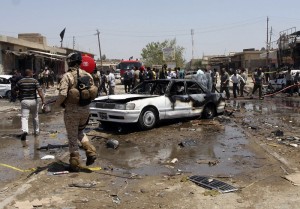5 car bombs kill 18 in Iraq

Civilians and security forces gather at the scene of a car bomb attack in the southern Shiite city of Karbala, 50 miles (80 kilometers) south of Baghdad, Iraq, Monday, April. 29, 2013. Five car bombs exploded Monday in predominantly Shiite cities and districts in central and southern Iraq, killing and wounding dozens of people, police said. AP PHOTO
BAGHDAD—Five car bombs on Monday killed 18 people south of Baghdad, the latest deaths in a week of violence, as Iraq’s parliament speaker called for the government to resign to ease spiraling tensions.
Prime Minister Nuri al-Maliki met Nechirvan Barzani, the premier of the autonomous Kurdistan region, with both agreeing to enhance security coordination after the deployment of Kurdish forces in disputed Kirkuk province threatened another crisis.
In the deadliest of the series of attacks on Monday, which mainly hit Shiite areas, two car bombs exploded in Amara in south Iraq, killing seven people and wounding 51, a senior police officer and a doctor said.
Three other car bombs detonated in Mahmudiyah, Karbala and Diwaniyah, leaving 11 people dead and 55 wounded, police and medical sources said.
A wave of violence began on Tuesday last week when security forces clashed with Sunni anti-government protesters near the Sunni Arab town of Hawijah in northern Iraq, killing 53 people.
Article continues after this advertisementThe protesters have called for the resignation of Maliki, a Shiite, and railed against authorities for allegedly targeting their community with wrongful detentions and accusations of involvement in terrorism.
Article continues after this advertisementSubsequent unrest killed dozens more and brought the seven-day death toll to more than 240 on Monday.
Border crossing closed
The interior ministry, meanwhile, said in an online statement the border crossing from Anbar province to Jordan would be closed from Tuesday due to an “internal Iraqi matter,” without elaborating.
More than 20 members of the security forces have been killed in Anbar since Tuesday.
So far this month, more than 450 people have been killed and over 1,200 wounded in violence across Iraq, based on a tally of official figures.
The latest bout of violence has raised fears of a return to all-out sectarian conflict, which plagued Iraq in past years.
On Monday, parliament speaker Osama al-Nujaifi, a Sunni and leading member of the secular, Sunni-backed Iraqiya bloc which has long been at odds with Maliki, called for the government to resign to reduce tensions and improve the situation in the country.
The aims of the initiative include “national reconciliation and maintaining the gains of democracy,” as well as “sparing the country from the spectre of civil war and sectarian strife,” Nujaifi’s office said.
Under Nujaifi’s proposal, the government would be replaced by a smaller cabinet of independents, the electoral commission would prepare for early polls, and the parliament would then be dissolved.
Iraq’s next parliamentary elections are scheduled for 2014.
PM supports dissolving parliament
Ali Mussawi, Maliki’s spokesman, said the premier supported dissolving parliament, but that the legislature must go before the government.
“We support dissolving the parliament,” Mussawi told AFP.
But he said the order suggested by Nujaifi was “unconstitutional,” and that the appropriate procedure was for parliament to be dissolved and the current government to continue in a caretaker role until new elections are held.
Maliki and Barzani met in Baghdad on Monday, just days after Kurdish peshmerga security forces deployed to new areas of the disputed northern province of Kirkuk.
The new deployments sharply raised tensions, with the commander of Iraq’s ground forces terming it an attempt to move into the province’s oil fields.
According to Maliki’s office, he and Barzani agreed to strengthen coordination on security and to work on passing key legislation, such as a law regulating Iraq’s oil and gas sector, which has languished in parliament for years.
Oil-rich Kirkuk province is a key part of territory that Kurdistan wants to incorporate over strong objections from the federal government in Baghdad, a dispute diplomats and officials say is a major threat to long-term stability.— W.G. Dunlop